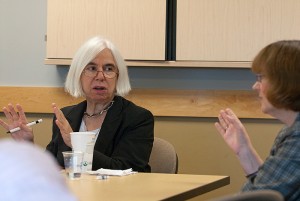
“Some of the research I’ll be presenting is very depressing,” warned gender equity expert Virginia Valian, speaking to an audience of faculty, department heads, and students at UConn on Oct. 15 about why women’s advancement in science and technical disciplines is slow.
But, she added, “People are working on this problem everywhere, including here at the University of Connecticut. It’s a big problem.”
Valian co-directed one of the first National Science Foundation-sponsored gender equity projects at Hunter College, where she is a distinguished professor of psychology and linguistics.
She was invited to speak and give workshops at UConn for department heads in the College of Liberal Art and Sciences by Dean Jeremy Teitelbaum. She also met with the provost and members of President Hogan’s cabinet, and with a team that is writing a UConn proposal to the NSF ADVANCE program to increase diversity among faculty in sciences, engineering, and math faculties – the “STEM” disciplines.
Valian cited a 2006 NSF study of women’s progress toward full professorships in STEM disciplines. It showed that 10 years post-Ph.D., 3.3 percent of men and 1.6 percent of women in academia were full professors. Ten to 19 years after receiving a Ph.D., 41 percent of men and 26 percent of women had achieved full professor status. Thirty years into their academic careers, 81 percent of men in the study and 75 percent of women academics were professors.
“Women never fully catch up in science as a whole,” she said.
Valian discounted the explanation that there aren’t enough women in the STEM pipeline to promote.
“The pipeline selectively leaks women,” she said. “It’s as if the pipeline has little holes in it, and they’re female shaped.”
Even those who stay in the pipeline and are promoted are not paid as well as men, she noted.
The lack of adequate childcare arrangements also does not explain why women do not advance, she said, noting that women with children who stay in academia actually publish more than those who are childless.
Her explanation for the gender gap is that both men and women share gender “schemas” that overvalue men’s professional capabilities and underrate women’s, and that an accumulation of small biases over a long period can have devastating effects on women’s careers.
Women face negative reactions even from job interviewers who believe they are equitable and have the best intentions, she added. Experiments have shown that subtle cues such as eye gaze and facial expressions can indicate a bias in job interviews that disadvantages women in seemingly small ways that add up to a bigger problem.
Gender schemas are ubiquitous and hard to change because we may not even be aware that we have them, she said. “You don’t need to feel guilty but you do need to take responsibility. We’re flawed judges of other human beings.”
She recommended that people develop procedures to check for bias, asking themselves whether they have developed an inclusive list for job interviews or colloquium speakers, for instance, or acknowledging women’s ideas in committee meetings and making sure they are heard.
“Leaders must lead,” she added, and not plead that other groups on campus won’t follow or must be deferred to.
She said that on balance, there is some reason for optimism: “We can put science to work to change how our institutions behave.”
A Q and A interview with Valian is available on the CLAS website.


